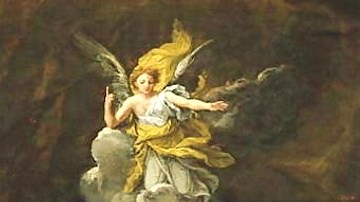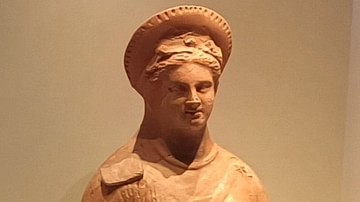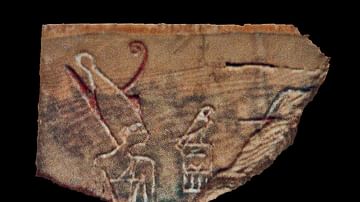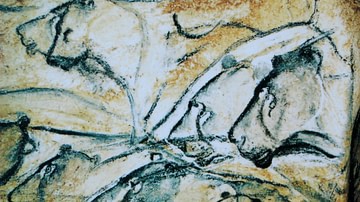Illustration
Terracotta icon depicting Daniel in the lions' den, found in Vinicko Kale, North Macedonia, 5th-6th century.
Archaeological Museum of the Republic of North Macedonia, Skopje.
The archaeological site of Vinicko Kale (Fortress of Vinica) is a fortified settlement overlooking the city of Vinica in North Macedonia. The site has been inhabited since prehistoric times, as suggested by many Neolithic objects excavated there. Its best documented period of occupation, however, was during the Late Antiquity and early Byzantine era, around the 4th to 6th centuries. The fortress may well have been established at an early stage of this period, strategically positioned to oversee the surrounding valley. The remains of fortifications, residential buildings, and public spaces discovered at the site highlight the importance of Vinicko Kale in the then-Roman province of Moesia, particularly regarding the militaristic turbulences leading to the conversion of most Balkan territories from the Roman-Byzantine provinces to the Slavic Bulgarian Empire states.
Beginning to come out in 1978, the terracotta icons discovered in Vinicko Kale are amongst the most remarkable religious finds of the early Christian era. These meticulously sculpted clay tablets are typically crafted in a rectangular shape to frame a snapshot of biblical events and characters from the Old Testament and Psalms. Unearthed originally at the bases of the defensive walls, it is believed that the icons were used as wall decorations in sacred spaces for more than five centuries. Many of these icons are labelled with Latin inscriptions, sometimes mingled with the Greek pronunciations and alphabet that can point to the characteristic blend of classical and Christian artistic trends. The icon exemplified here, showing Daniel in the lions' den, is topped with the words: "Ad Dominoς [dominus]", as a reminder of God's protective presence. The location designated to this event, Susa, is mentioned on the left, while the protagonist's name tag, 'SCS [Sanctus] Daniel', is carved around his head.
About the Author
Photo Location
This photograph was taken at the following location:
External Links
Cite This Work
APA Style
Choubineh, N. (2024, August 22). Macedonian Terracotta Icon of Daniel in the Lions' Den. World History Encyclopedia. Retrieved from https://www.worldhistory.org/image/19345/macedonian-terracotta-icon-of-daniel-in-the-lions/
Chicago Style
Choubineh, Nathalie. "Macedonian Terracotta Icon of Daniel in the Lions' Den." World History Encyclopedia. Last modified August 22, 2024. https://www.worldhistory.org/image/19345/macedonian-terracotta-icon-of-daniel-in-the-lions/.
MLA Style
Choubineh, Nathalie. "Macedonian Terracotta Icon of Daniel in the Lions' Den." World History Encyclopedia. World History Encyclopedia, 22 Aug 2024, https://www.worldhistory.org/image/19345/macedonian-terracotta-icon-of-daniel-in-the-lions/. Web. 30 Jun 2025.








